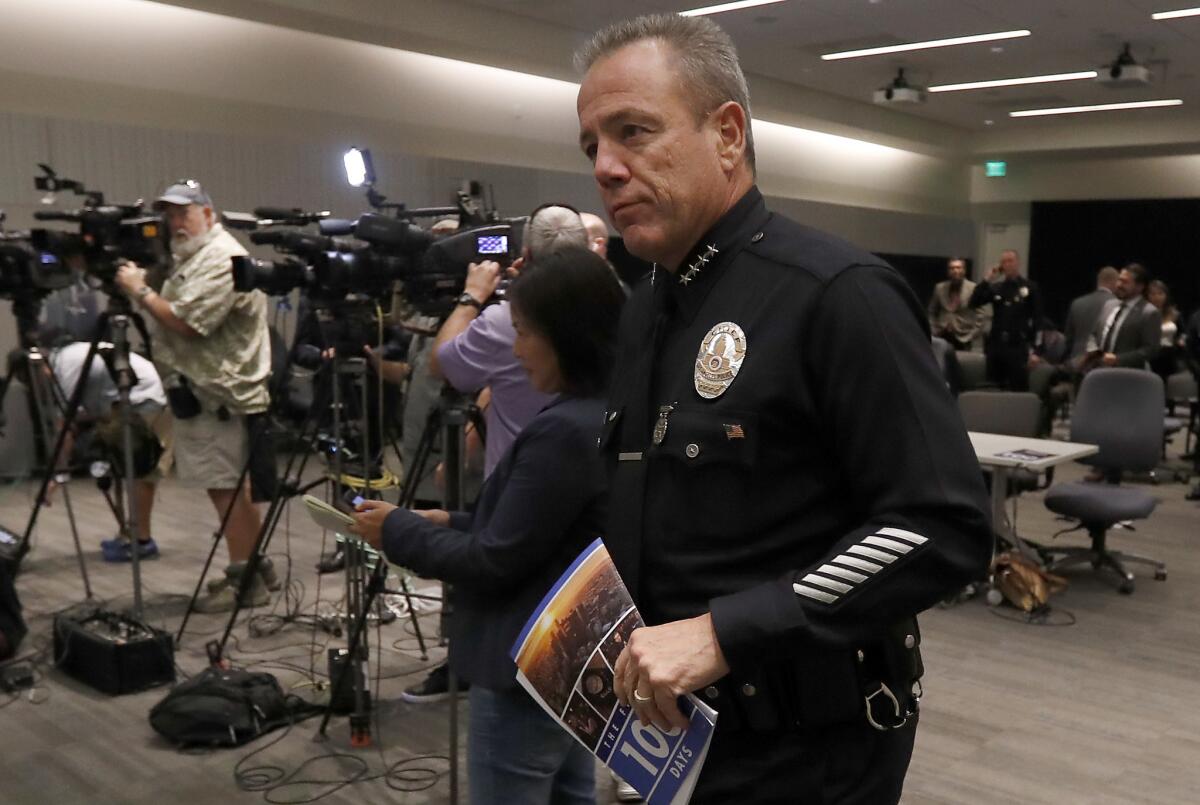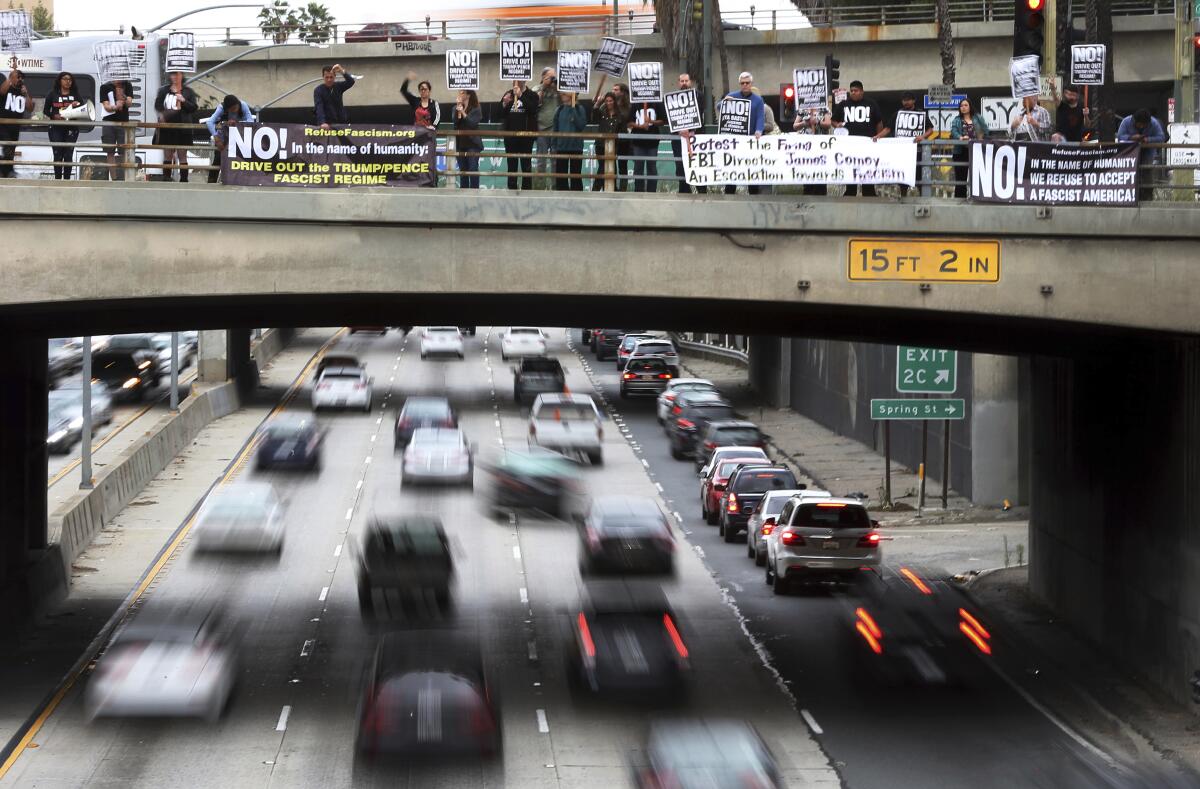LAPD to change policy on use of informants after furor over decision to spy on anti-Trump group

- Share via
The Los Angeles Police Department will modify its policies on the use of confidential informants and undercover officers after a Los Angeles Times report revealed the agency had spied on a political group that was planning protests against President Trump in 2017, officials said.
Chief Michel Moore told the Police Commission Tuesday that the decision to deploy informants inside sensitive locations — including churches, hospitals or law offices — or among political groups will now require the approval of some of the department’s highest-ranking officers.
For the record:
10:02 a.m. Sept. 13, 2019An earlier version of this article said a protest was staged in downtown Los Angeles by Refuse Fascism on election day 2017. That protest was held Nov. 4, 2017, just before the one-year anniversary of President Trump’s 2016 electoral victory.
“The use of a confidential informant or undercover officer at a place of worship or other sensitive location where 1st Amendment protected activities [are] conducted, I believe, should receive a higher level of scrutiny and approval before becoming operational, to ensure that the benefit of the investigative technique is not outweighed by the potential loss of public trust,” Moore said Tuesday.
The policy change comes after The Times revealed that the department had sent an informant to monitor and surreptitiously record four meetings held by Refuse Fascism in October 2017 as the group planned demonstrations and protests to mark the one-year anniversary of President Trump’s election. Refuse Fascism is considered to be a largely nonviolent group, yet the LAPD informant monitored four of its meetings inside an Echo Park church.
Records about the informant’s activities became public as part of a criminal case against members of Refuse Fascism who blocked downtown freeways during two separate protests in 2017. The informant filed multiple reports but never uncovered any information about potential violence or crimes being plotted by the group, according to court records.
Civil liberties advocates and experts who monitor street protests described the LAPD’s tactics as “deeply troubling.” The protest that Refuse Fascism ultimately staged in downtown Los Angeles on the one-year anniversary of Trump’s November 2016 election victory ended with just two arrests and no injuries.

The LAPD did not conduct similar spying operations on right-wing groups in the lead-up to the one-year anniversary of the presidential election, a law enforcement source previously told The Times.
Moore said the department’s actions in the Refuse Fascism case did not violate LAPD policy, and he did not believe investigators had done anything wrong. Some of the department’s highest-ranking officials, including former Police Chief Charlie Beck, had been made aware of the operation even though it was not required by policy, Moore said.
Going forward, Moore said, he wants to make sure that such reviews are mandated. The department’s general counsel may also become involved in such decisions, according to Moore, who said he now considers the matter closed.
“It’s not a judicial review, but it is an effort to ensure that the strategy is warranted given the sensitive nature of the location and the public perception of whether or not we are respectful and mindful of the added deference that society places on these locations,” Moore said.
Moore said he expects a written policy to be developed and implemented by the end of the year.
Moore has said the decision to place an informant inside Refuse Fascism followed violence at street demonstrations in other parts of the country. The operation was carried out less than two months after a white supremacist rally in Charlottesville, Va., left one woman dead and dozens injured, and also came on the heels of repeated brawls between anti-fascist and far-right groups in the Bay Area.
Refuse Fascism has a chapter in the Bay Area, but police never provided evidence that the Los Angeles sect had anything to do with violence in San Francisco or Berkeley. Arrest records from those incidents show most of those accused of violence during those protests were from the Bay Area.
Chantelle Hershberger, a Refuse Fascism member who was among those arrested in the 2017 freeway protests, said the proposed policy change was meaningless if the LAPD would not admit its initial decision to monitor the group was wrong.
“In keeping with the long, bloody history of LAPD spying and political repression, Moore’s comments amount to saying: ‘It’s fine because we say so,’” she said. “The allegedly independent Police Commission gives this a rubber stamp – with no evidence, no transparency, inconsistencies in Moore’s comments and nothing in place to stop them in the future except an empty promise of reforms ... promises the LAPD has made and broken again and again.”
Civil rights advocates met news of the policy change with skepticism. Mohammad Tajsar, a staff attorney with the American Civil Liberties Union in Southern California who specializes in surveillance matters, said the LAPD should allow for independent review of its potential use of informants. He also scoffed at Moore’s conclusion that the department had done nothing wrong.
“The fact that they substantively concluded that this was OK is, to me, the real problem. I don’t understand why that was a determination given the facts here,” Tajsar said. “The real answer here is ‘Look. We screwed up.’”
More to Read
Sign up for Essential California
The most important California stories and recommendations in your inbox every morning.
You may occasionally receive promotional content from the Los Angeles Times.














